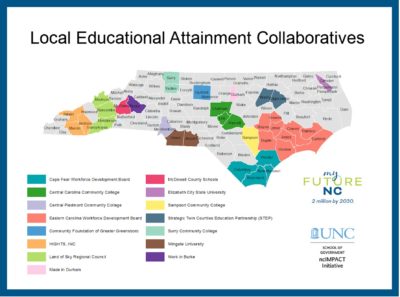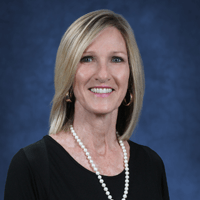
The night air is full of dreams. According to the Native American Ojibwe tribe, the dreamcatcher lets in the good dreams as they find their way through to the center of the circle. We see our state’s community colleges as dreamcatchers. At no time is that clearer than on graduation day.
Each of us had the gift of speaking to a 2023 graduating class. Here are our stories and speeches.
From Anita Brown-Graham, director of ncIMPACT Initiative at the UNC School of Government
I am the director of the ncIMPACT Initiative at the UNC School of Government. I work with many of our state’s community college campuses and have partnered often with the North Carolina Community College System. As such, my admiration for the work of these institutions has been high for a long time. This year, I was asked to offer the commencement address at Halifax Community College. That seemed easy. After all, I have done more than a handful of commencement addresses.
I wish I had known enough to be more prepared.
I arrived with some notes on paper. I came with confidence to tell the graduates to be prepared to fail, not be paralyzed by fear, and find and protect what centered them. Long before I was introduced to give my remarks, I had begun to cry.
There were about 200 graduates present. Yet there was barely an empty seat (I saw none) in the 1,500 person auditorium. Rumor had it that one person’s grandmother was in line at 6:30 am for the 10:00 am ceremony. The lines had been long. Families and friends were not inclined to sit in the overflow room. Indeed, when they closed the doors for the processional, I heard a mother wailing. When I walked in, the pride that engulfed the room was more palpable than any room in which I have ever stood — ever.
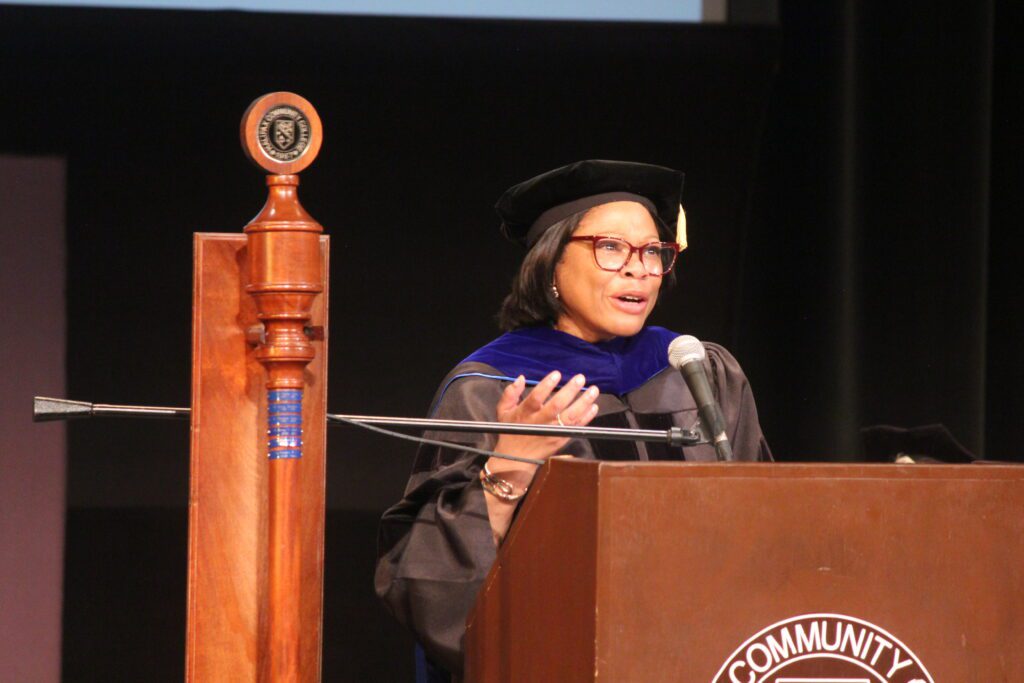
As we sat and began the ceremony, it was impossible to contain the loud calls of congratulations that came from the crowd. As the soloist belted the words, “I don’t feel no ways tired. I’ve come too far from where I started from,” I lost it. I could see in the faces of the graduates the untold stories of hardships and hardiness. They had made it, for some from a mighty long way, and they were just getting started on their “good dreams.” They did not need me to tell them about failure or fear — and certainly not about finding their center.
So, I did what most good graduation speakers must do. I said as little as possible and then sat down.
The following is an excerpt from my speech.
As you leave this institution today, carry these themes with you as your guiding light: Prepare to fail, for it is in failure that your head will find the greatest learnings and triumphs. And, please, ignore the fear factor, and let your heart lead you to a life filled with purpose and love as you embrace your passions, follow your intuition, and overcome your fears. Finally, remember, your center. It is not selfish to take care of yourself. By protecting your peace and what centers you, you will soar to heights unimaginable today and make a lasting difference in the lives of those around you.
Class of 2023, congratulations on your achievements, and may your future be filled with endless opportunities and remarkable successes. As you step into the unknown, may you face your challenges ahead with courage, resilience, and the determination to never stop growing.
Please remember, you are not alone. You have each other and the many people gathered here today to celebrate you. As I take my seat, let me ask you to stand and applaud your faculty, family, and friends. These are the people who believed you could get to this day, and you have proven them to have been very wise.
Anita Brown-Graham
From Cecilia Holden, president and CEO of myFutureNC
Through the work of myFutureNC, I am fortunate to present to many audiences; however, nothing compares to being a commencement speaker to college graduates on one of the most special days of their lives. The age of the graduates often ranges from teens to seventies, as educational attainment has no boundaries, and lifelong learning represents opportunity for all. To “commence” is to begin, so while graduation day marks the end of a student’s journey in the classroom, it also marks the beginning of their new life.
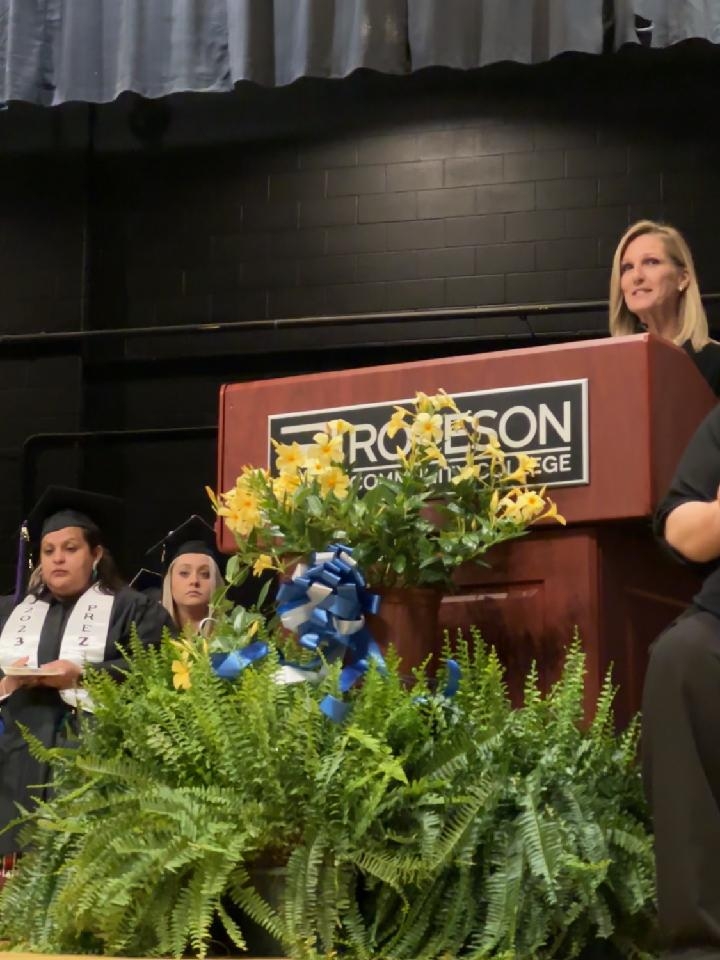
The state’s great 58 community colleges are essential to North Carolina’s ability to achieve its’ educational attainment goal of 2 million by 2030. Education is the way out of poverty, so for our local communities, including Robeson County residents, community college graduation day represents hope — hope for a county ranked among the poorest in North Carolina.
The morning of May 10, 2023, I arrived on campus at Robeson Community College for the first of their two graduation ceremonies at which I would speak that day. I grew up in neighboring Columbus County, so it felt great to be back in my “neck of the woods.”
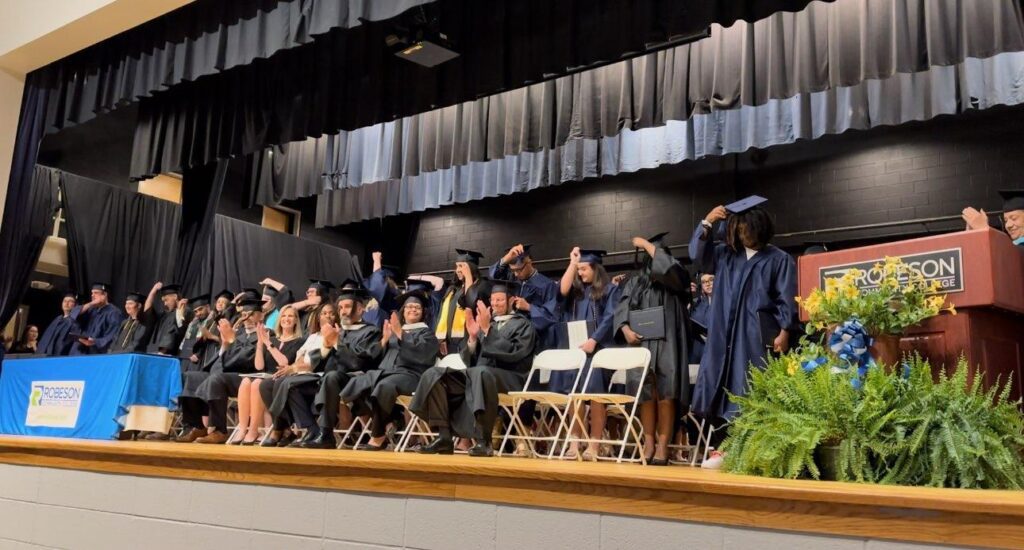
As I stood back and listened to the “pre-game” conversations, excitement filled the air and warmed my heart in ways that cannot be replicated. Never is there a more rewarding time than seeing the dreams of each student being achieved as they crossed the stage that day, holding their heads high and heading into the future that many thought was never possible.
The pride of family and friends was second to none. A lady on the front row, unknown by everyone, celebrated the success of each student that day at both ceremonies, shouting compliments and words of encouragement to each student as they were handed their diploma. The faculty and staff were as proud of each graduate as if it were their own child. Seeing each student become a college alum brought me joy that day and keeps me motivated every day — a dream accomplished, and something no one can take away from these students — their education.
One by one by one gets the state to 2 million by 2030 and economic prosperity for all.
The following is an excerpt from my speech.
No matter who we are and what age we are, it is human nature to want to be a part of something much bigger than ourselves. I’m going to take a few minutes to share with you what you are a part of today. When you graduate and you walk across this stage, you will become one of thousands of students who have now graduated from this fine institution. But you’re not just that number. You are a number that fits into a larger goal that’s been set by the state of North Carolina.
You see — North Carolina has a skills gap crisis. I would even go so far as to call this a state of emergency around workforce talent.
You could not be graduating at a better time than now, because two thirds of the businesses across the state need employees who have some level of education after high school. But only about half of North Carolinians have the level of education necessary to meet the needs of our employers.
If you take 100 ninth grade students today, only 28 of these ninth graders will graduate high school on time and then go on to earn a credential or a 2- or 4-year degree within six years of high school graduation.
Twenty-eight out of 100 — that is less than a third of high school students, but what I said before is that two-thirds of our jobs require higher levels of education.
To address the skills gap, in 2019, the North Carolina General Assembly passed legislation with bipartisan support and a signature from the governor that included an educational attainment goal for the state. The goal is to have 2 million North Carolinians ages 25-44 with an industry-valued credential or a college degree by the year 2030.
This goal was put in place to make sure North Carolina remains economically competitive now and into the future, and that our citizens have opportunity for upward mobility and prosperity.
Today in North Carolina, depending on what part of the state you live in, someone with a high school diploma can expect to earn around $27,000 per year — 15 years after high school graduation.
Workers with an associate degree, however, can expect to earn on average more than twice as much.
The difference in your earning potential after graduating today can have a significant impact on the health and financial security for you and your family. So, not only have you changed your future, but you’ve also improved the future for generations to come.
Cecilia Holden
Watch Holden’s commencement address below.
Recommended reading
